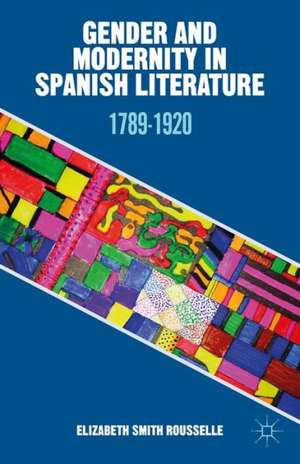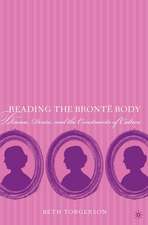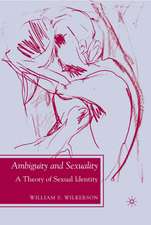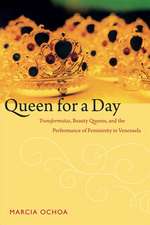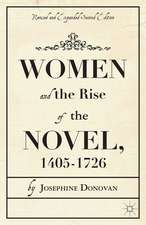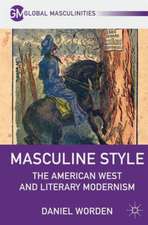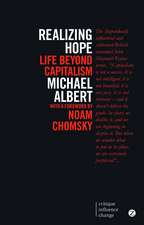Gender and Modernity in Spanish Literature: 1789-1920
Autor Kenneth A. Loparoen Limba Engleză Hardback – 2 oct 2014
| Toate formatele și edițiile | Preț | Express |
|---|---|---|
| Paperback (1) | 382.57 lei 6-8 săpt. | |
| Palgrave Macmillan US – 2 oct 2014 | 382.57 lei 6-8 săpt. | |
| Hardback (1) | 385.84 lei 6-8 săpt. | |
| Palgrave Macmillan US – 2 oct 2014 | 385.84 lei 6-8 săpt. |
Preț: 385.84 lei
Nou
Puncte Express: 579
Preț estimativ în valută:
73.86€ • 76.01$ • 62.26£
73.86€ • 76.01$ • 62.26£
Carte tipărită la comandă
Livrare economică 01-15 martie
Preluare comenzi: 021 569.72.76
Specificații
ISBN-13: 9781137442031
ISBN-10: 1137442034
Pagini: 232
Ilustrații: X, 232 p.
Dimensiuni: 140 x 216 x 15 mm
Greutate: 0.36 kg
Ediția:2014
Editura: Palgrave Macmillan US
Colecția Palgrave Macmillan
Locul publicării:New York, United States
ISBN-10: 1137442034
Pagini: 232
Ilustrații: X, 232 p.
Dimensiuni: 140 x 216 x 15 mm
Greutate: 0.36 kg
Ediția:2014
Editura: Palgrave Macmillan US
Colecția Palgrave Macmillan
Locul publicării:New York, United States
Cuprins
Introduction: The Female and Male Modern Spanish Subject PART I: DISILLUSION AND OPTIMISM IN THE AGE OF ENLIGHTENMENT 1. (Dis)Order: Writing Spain's Chaos in José Cadalso's Cartas Marruecas and Righting Spain's Wrongs in Josefa Amar y Borbón's Discurso sobre la educación física y moral de las mujeres 2. Decorum and Love in the Spanish Enlightenment: José Mor de Fuentes's La Serafina and María Lorenza de los Ríos's La sabia indiscreta PART II: (DIS)ENCHANTED PASSION AND CRITIQUE IN CONTEXTS OF ROMANTICISM AND REALISM 3. Masculine Extremes: The (Anti)-Flâneur and Male Hysteric in Articles by Mariano José de Larra and Short Novels by Rosalía de Castro 4. Religion, Race, Class, and Gender in the Age of Positivism: Female Empowerment in Fernán Caballero's Simón Verde and Female Uselessness in Benito Pérez Galdós's Marianela PART III: PSYCHOLOGICAL, ARTISTIC, AND SPIRITUAL ALLUSIONS AND (DIS)ILLUSIONS BEFORE AND AFTER THE DISASTER OF 1898 5. Solipsistic Inertia: Decadent Dreams in Leopoldo Alas's Su único hijo and Emilia Pardo Bazán's La quimera 6. The Spiritual Solution: Mysticism as a Means to Individual Authenticity and Optimism in Benito Pérez Galdós's Nazarín and Emilia Pardo Bazán's Dulce Dueño PART IV: SYMBOLS OF (DIS)ILLUSION IN THE EARLY TWENTIETH CENTURY 7. Lamenting the State of Science and Feminism: Negative Secularism in Pío Baroja's El árbol de la ciencia and Ambiguity in Carmen de Burgos's El Perseguidor 8. Maternal Abjection and the Death of Don Juan in Las hijas de Don Juan by Blanca de los Ríos and Dos madres by Miguel de Unamuno Conclusion: Modern Spanish Subjects: Disillusioned Men and Hopeful Women
Recenzii
"Rousselle tackles Spain's conflicted relationship with modernity by examining texts by renowned male and female writers from the Enlightenment to the early twentieth century through the focal point of disillusion. In the process, she reveals a key difference in the gendered responses to what it meant to be a modern subject." - Ana Rueda, Arts and Sciences Distinguished Professor of Hispanic Studies, University of Kentucky, USA, and author of Relatos desde el vacío. Un nuevo espacio crítico para el cuento actual, Pygmalión y Galatea: Refracciones modernas de un mito and Cartas sin lacrar: La novela epistolar y la España Ilustrada 1789-1840.
"Developing a theory of 'gendered disillusion,' Rousselle's fascinating subject is the reactions to the chaos, confusion, and economic and political decline in the wake of the French Revolution in Spain. With expert plotting, and able to take both the long view and to examine the detail, Rousselle takes us through a variety of literary contexts from 1789 to 1920 and produces scintillating readings each of which presents us with a new way to understand Spain's different transition to modernity" - Sarah Wright, Reader in Hispanic Studies, Royal Holloway, University of London, UK, and author of Tales of Seduction: The Figure of Don Juan in Spanish Culture
"This book demands the close attention of anyone interested in European intellectual history and modern Spanish male and female subjectivity. It is among the firstbooks to examine attitudes to modernity on the Iberian Peninsula. As such, it will surely become a pathfinder for others to continue to build on its authoritative conclusions. Meticulously developed and lucidly written, Gender and Modernity in Spanish Literature is required reading for scholar and student alike." - C. Christopher Soufas, Professor of Spanish, Temple University, USA and author of The Subject in Question: Early Contemporary Spanish Literature and Modernism
"A most valuable tool in the study of modernity and the role that disillusionment played in its development in Spain. Most notably, Rousselle provides the long history of what modernity means within the changing Spain after the French revolution, showing the reader both a cultural and historical canvas of what was it like to produce literary texts under the umbrella of 'disillusion.'" - Leslie Anne Merced, Associate Professor of Spanish, Rockhurst University, USA
"Developing a theory of 'gendered disillusion,' Rousselle's fascinating subject is the reactions to the chaos, confusion, and economic and political decline in the wake of the French Revolution in Spain. With expert plotting, and able to take both the long view and to examine the detail, Rousselle takes us through a variety of literary contexts from 1789 to 1920 and produces scintillating readings each of which presents us with a new way to understand Spain's different transition to modernity" - Sarah Wright, Reader in Hispanic Studies, Royal Holloway, University of London, UK, and author of Tales of Seduction: The Figure of Don Juan in Spanish Culture
"This book demands the close attention of anyone interested in European intellectual history and modern Spanish male and female subjectivity. It is among the firstbooks to examine attitudes to modernity on the Iberian Peninsula. As such, it will surely become a pathfinder for others to continue to build on its authoritative conclusions. Meticulously developed and lucidly written, Gender and Modernity in Spanish Literature is required reading for scholar and student alike." - C. Christopher Soufas, Professor of Spanish, Temple University, USA and author of The Subject in Question: Early Contemporary Spanish Literature and Modernism
"A most valuable tool in the study of modernity and the role that disillusionment played in its development in Spain. Most notably, Rousselle provides the long history of what modernity means within the changing Spain after the French revolution, showing the reader both a cultural and historical canvas of what was it like to produce literary texts under the umbrella of 'disillusion.'" - Leslie Anne Merced, Associate Professor of Spanish, Rockhurst University, USA
Notă biografică
Elizabeth Smith Rousselle is Associate Professor in the Department of Languages at Xavier University of Louisiana, USA.
